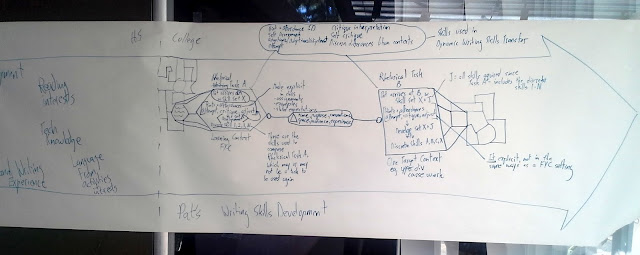 | |
| An early attempt at mapping writing skill transfer (spelling errors are included to test readers like you) |
The picture above is what I worked on yesterday. I was attempting to clear up some concepts.
Here's what I'm going for in the picture:
I drew a timeline representing the writing development of an imaginary student named Pat. There's a hexagon to represent a task Pat composed in her freshman-year writing course. And there's a square representing a writing task she composed years later for an upper-division course in her major. These two events are described as separate, but they are really fragments of Pat's literacy development.
Here's the issue I'm attempting to get at: The type of writing Pat did in her freshman writing course is very different than the writing she did later in college - and later in life. This raises the following question: What skills did Pat learn in her freshman writing course that helped her with her later coursework?
The answer to that question should describe the skills teachers emphasize in freshman composition, but the work I've done for the past few years has shown that instructors often dodge this question or answer with vague unmeasurable abstractions.
The diagram is an attempt to get at something instructors can act on. It's still rough, but it is moving me in the right direction - away from the abstract.
Let's say that after Pat finished her freshman year she declared a major in mechanical engineering. Later, near the end of her junior year, Pat is told to write a technical report about some work she's done on wireless networking.
Take a moment to think about all the differences between between the two tasks
- Time has past
- The audience is different
- The purpose for writing is different
- The writing conventions are different
- The subject matter is different
- Pat is different!
The sidewalk in the video here changes over time, gains a new audience, and a new purpose. The chalk drawing fools the eye into thinking that the sidewalk is no longer a sidewalk at all. For someone hoping to create something like this, however, it is crucial to remain aware of the qualities the sidewalk had before the first line was drawn.
Getting back to Pat, which skills used to write her freshman composition paper are still useful when writing the technical report?
Here's the direction my drawing has taken me: Beyond a firm command of grammar and spelling, we expect a college-level writer to have skills that facilitate independent learning in new writing environments.
In other words, after completing college, Pat should have the skills required to join a new community and teach herself how to effectively write in that setting. Of course she can't do that alone. In order to learn to communicate in a new setting, the new community must afford Pat the time and resources required to learn about the ways people in that community write.
So, Pat has to know how to find and evaluate the writing of others. She has to know how to solicit, recognize, and utilize feedback. She must be practiced at self-assessment. She must know how to identify clues that will help her adjust her writing practices, which assumes she knows how to adjust her writing practices. And Pat needs to have the self-confidence and patience to recognize that these skills will only get her foot in the door - that writing for a new community will require the application of these skills to produce new knowledge - knowledge that will eventually help her gain a voice and authority in the communities she seeks to join.
I also believe that Pat should be intellectually wary of any community that makes it either too easy or too difficult for new members to move through these processes. But that's for another blog post.
So that's what I'm working on. I may take the blog along this road for a while. Trying to express these ideas for people who are not compositionists seems like a good way to maintain the blog while staying focused on my work.



